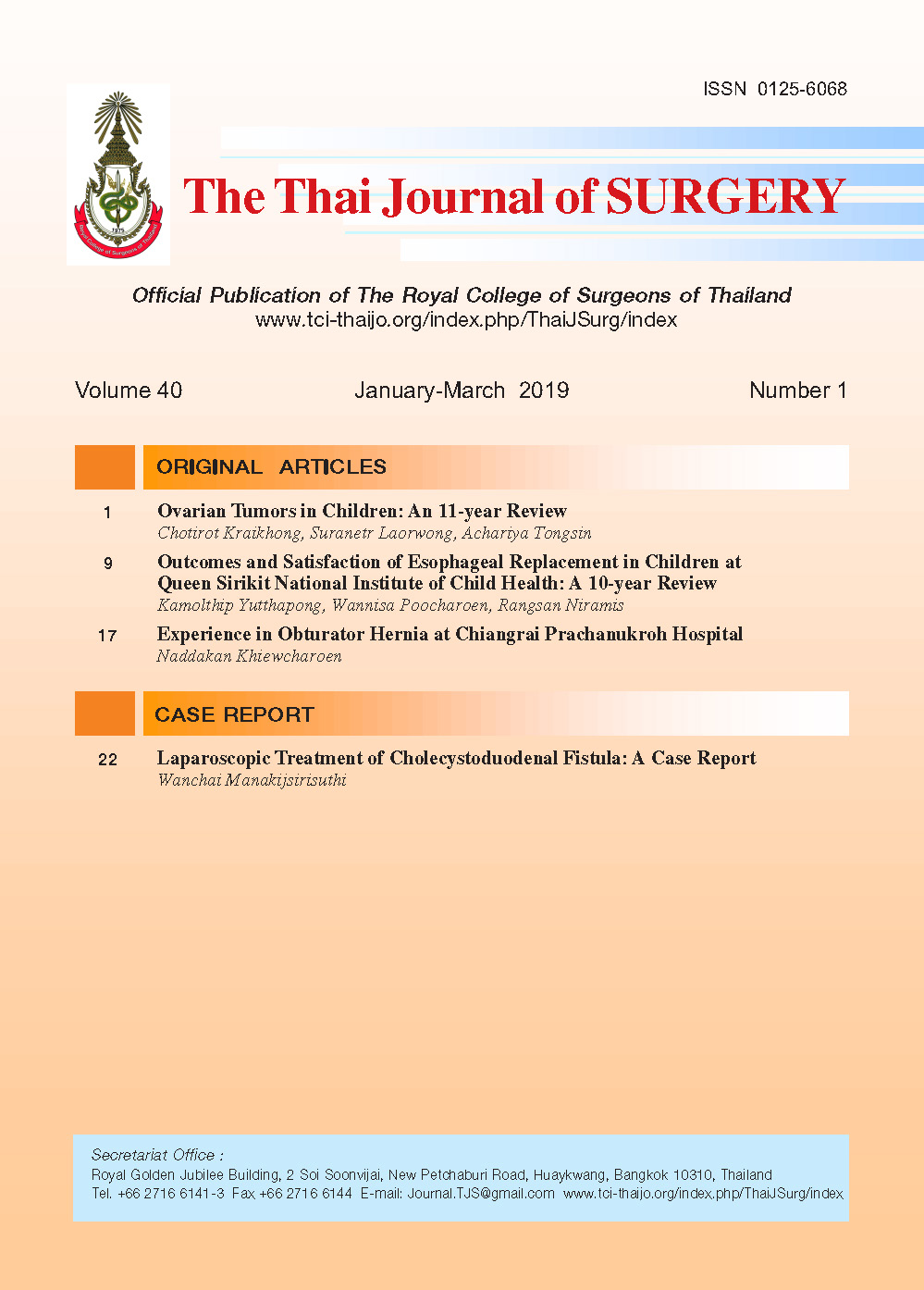Ovarian Tumors in Children: An 11-year Review
Keywords:
Ovarian tumors, Children, Epithelial cell tumor, Germ cell tumor, Sex cord and stromal tumor, Cystadenoma, Teratoma, Granulosa-theca cell tumor, Follicular cystAbstract
Background: Ovarian tumors in girls are important part of gynecological oncology. They may produce a wide range of clinical conditions according to nature, size and a time period of presentation.
Objective: To analyze the data of patients with ovarian tumors treated at Queen Sirikit National Institute of Child Health and compare between benign and malignant characteristics.
Materials and Methods: A retrospective study was conducted by reviewing of medical records of the patients with ovarian tumors treated at Queen Sirikit National Institute of Child Health between 2007 and 2017. Patients’ data including demographics, clinical presentations, investigations, type of ovarian tumors, operative procedures and outcomes were collected and analyzed.
Results: Eighty-six patients were surgically treated for ovarian tumors during the study period. Benign and malignant tumors were classified in 74 (86%) and 12 cases (14%) respectively. Differences in clinical presentation, palpable abdominal mass was more frequent in malignant than benign masses (91.7% : 67.9%; p = 0.023). Precocious puberty and abnormal vaginal bleeding were specific presentation in malignant tumor only. Cystic masses were more frequent in benign than malignant tumors (48.6% : 8.3%; p = 0.002) and solid masses were more common in malignant than benign ovarian tumors (33.3% : 1.4%; p = 0.001). Tumor markers including alpha-fetoprotein (AFP), b-human chorionic gonadotrophin (b-hCG) and lactic dehydrogenase (LDH) significantly elevated in malignant GCTs and SCSTs (p < 0.05). Sizes of the tumors were not differentiated benign from malignant ovarian tumors. Almost all of the 84 cases with ovarian tumors were treated by oophorectomy or salpingo-oophorectomy. All 74 benign cases were alive. One case of the malignant group with T-cell lymphoma died one month after surgery and 4 cases lost to follow-up. The 2-year survival rate was 58.3%.
Conclusion: Benign ovarian tumors had more common occurrence 6 times than malignant ones. Presentations of palpable abdominal mass, solid tumor from imaging and elevation of serum tumor markers were strongly suspicious of malignant tumors of the ovary.
References
Lindfors O. Primary ovarian neoplasms in infants and children. A study of 81 cases diagnosed in Finland and Sweden. Ann Chir Gynaecol Fenn (Suppl) 1971; 177:1-66.
Skinner MA, Schlatter MG, Heifetz SA, et al. Ovarian neoplasms in children. Arch Surg 1993; 128:849-54.
Brookfield KF, Cheung MC, Koniaris LG, et al. A population-based analysis of 1037 malignant ovarian tumors in the pediatric population. J Surg Res 2009; 156:45-9.
Oltmann SC, Garcia N, Barber R, et al. Can we preoperatively risk stratify ovarian masses for malignancy? J Pediatr Surg 2010; 45:130-4.
Epelman M, Chikwava KR, Chauvin N, et al. Imaging of pediatric ovarian neoplasms. Pediatr Radiol 2011; 4:1085-99.
Brown MF, Hebra A, McGeehin K, et al. Ovarian masses in children: a review of 91 cases of malignant and benign masses. J Pediatr Surg 1993; 28:930-2.
Valteau-Couanet D, Dubrel M, Dufour C, et al. Malignant ovarian tumors in childhood. Arch Pediatr 2008; 15:781-2.
Martelli H, Patte C. Gonadal tumours in children. Arch Pediatr 2003; 10:246-50.
Anthony EY, Caserta MP, Singh J, et al. Adnexal masses in female pediatric patients. AJR Am J Roentgenol 2012; 198:426-31.
Madenci AL, Levine BL, Laufer MR, et al. Preoperative risk stratification of children with ovarian tumors. J Pediatr Surg 2016; 51:1507-12.
Stranzinger E, Strouse PJ. Ultrasound of the pediatric female pelvis. Semin Ultrasound CT MR 2008; 29(2):98-113.
Amies Oelschlager A-ME, Sawin R. Teratomas and ovarian lesions in children. Surg Clin North Am 2012; 92(3):599-613.
Loh AH, Ong CL, Lam SL, et al. Pediatric risk of malignancy index for preoperative evaluation of childhood ovarian tumors. Pediatr Surg Int 2012; 28:259-66.
Young RH, Dickersin GR, Scully RE. Juvenile granulosa cell tumor of the ovary: a clinicopathological analysis of 125 cases. Am J Surg Pathol 1984; 8:575-96.
Heling KS, Chaoui R, Kirchmair F, et al. Fetal ovarian cysts: prenatal diagnosis, management and postnatal outcome. Ultrasound Obstet Gynecol 2002; 20:47-50.
Ruttenstock EM, Saxena AK, Schwinger W, et al. Pediatric ovarian tumors-dilemmas in diagnosis and management. Eur J Pediatr Surg 2010; 20:116-20.
Cass DL. Surgery for ovarian masses in infants, children, and adolescents: 102 consecutive patients treated in a 15-year period. J Pediatr Surg 2001; 36:693-9.
Billmire D, Vinocur C, Rescorla F, et al. Outcome and staging evaluation in malignant germ cell tumors of the ovary in children and adolescents: an intergroup study. J Pediatr Surg 2004; 39:424-9.
Vaysse C, Delsol M, Carfagna L, et al. Ovarian germ cell tumors in children. Management, survival and ovarian prognosis. A report of 75 cases. J Pediatr Surg 2010; 45:1484-90.
Spinelli C, Pucci V, Buti I, et al. The role of tumor markers in the surgical approach of ovarian masses in pediatric age: a 10-year study and a literature review. Ann Surg Oncol 2012; 19:1766-73.
Gobel U, Schneider DT, Calaminus G, et al. Germ-cell tumors in childhood and adolescence. GPOH MAKEI and the MAHO study groups. Ann Oncol 2000; 11:263-71.
Stankovic ZB, Djukic MK, Savic D, et al. Pre-operative differentiation of pediatric ovarian tumors: morphological scoring system and tumor markers. J Pediatr Endocrinol 2006; 19:1231-8.
Chabaud-Williamson M, Netchine I, Fasola S, et al. Ovarian-sparing surgery for ovarian teratoma in children. Pediatr Blood Cancer 2011; 57:429-34.
Downloads
Published
Versions
- 2022-02-16 (2)
- 2019-03-31 (1)
How to Cite
Issue
Section
License
Copyright (c) 2019 The Royal College of Surgeons of Thailand

This work is licensed under a Creative Commons Attribution-NonCommercial-NoDerivatives 4.0 International License.
Articles must be contributed solely to The Thai Journal of Surgery and when published become the property of the Royal College of Surgeons of Thailand. The Royal College of Surgeons of Thailand reserves copyright on all published materials and such materials may not be reproduced in any form without the written permission.



